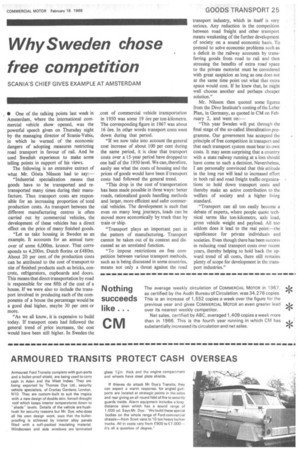Why Sweden chose free competition
Page 27

If you've noticed an error in this article please click here to report it so we can fix it.
SCAN IA'S CHIEF GIVES EXAMPLE AT AMSTERDAM • One of the talking points last week in Amsterdam, where the international commercial vehicle show opened, was the powerful speech given on Thursday night by the managing director of Seania-Vabis, in which he warned of the economic dangers of adopting measures restricting road transport in favour of rail. And he used Swedish experience to make some telling points in support of his views.
The following is an extensive extract of what Mr. Gosta Nilsson had to say:—
"Industrial specialization means that goods have to be transported and retransported many times during their manufacture. Thus transport costs are responsible for an increasing proportion of total production costs. As transport between the different manufacturing centres is often carried out by commercial vehicles, the development of these vehicles has a direct effect on the price of many finished goods.
"Let us take housing in Sweden as an example. It accounts for an annual turnover of some 6,000m. kronor. That corresponds to 4,200m. Dutch florMs or £480m. About 20 per cent, of the production costs can be attributed to the cost of transportto site of finished products such as bricks, concrete, refrigerators, cupboards and doors This means that direct transportation by road is responsible for one fifth of the cost of a house. If we were also to include the transport involved in producing each of the components of a house the percentage would be a good deal higher, maybe 30 per cent or more.
"As we all know, it is expensive to build today. If transport costs had followed the general trend of price increases, the cost would have been still higher. In Sweden the Cost of commercial vehicle transportation in 1950 was some 19 ore per ton-kilometre. The corresponding figure in 1967 was about 16 ore. In other words transport costs went down during that period.
"If we now take into account the general cost increase of about 100 per cent during the same period, it is clear that transport costs over a 15-year period have dropped to one half of the 1950 level. We can, therefore, easily see what the costs of housing and the prices of goods would have been if transport costs had followed the general trend.
"This drop in the cost of transportation has been made possible in three ways: better roads, rationalized goods handling methods and larger, more efficient and safer commercial vehicles. The development is such that even on many long journeys, loads can be moved more economically by truck than by train or ship.
"Transport plays an important part in the pattern of manufacturing. Transport cannot be taken out of its context and discussed as an unrelated function.
"To impose restrictions on free competition between various transport methods, such as is being discussed in some countries, means not only a threat against the road transport industry, which in itself is very serious. Any reduction in the competition between road freight and other transport means weakening of the further development of society on a sound economic basis. To pretend to solve economic problems such as a deficit in the railway accounts by transferring goods from road to rail and then stressing the benefits of extra road space to the private motorist must be considered with great suspicion as long as one does not at the same time point out what that extra space would cost. If he knew that, he might well choose another and perhaps cheaper solution."
Mr. Nilsson then quoted some figures from the Diva Institute's costing of the Leber Plan, in Germany, as quoted in CM on February 2, and went on:- "This year Sweden will put through the final stage of the so-called liberalization programme. Our government has accepted the principle of free competition in transport and that each transport system must bear its own costs. It may seem surprising that a country with a state railway running at a loss should have come to such a decision. Nevertheless, I am personally convinced that this attitude in the long run will lead to increased effort in both rail and road freight traffic organizations to hold down transport costs and thereby make an active contribution to the welfare of society and a higher living standard.
."Transport can all too easily become a debate of experts, where people quote technical terms like ton-kilometre, axle load, gross vehicle weight and payload. All too seldom does it lead to the real point the significance for private individuals and societies. Even though there has been success in reducing road transport costs over recent years, thereby helping to hold back the upward trend of all costs, there still remains plenty of scope for development in the transport industries."




















































































































